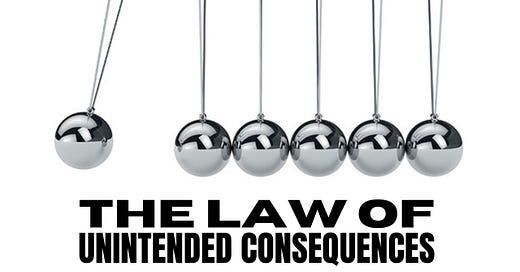The Law of Unintended Consequences
Every action in nature has an equal and opposite reaction. And not just in the world of physics.
Sir Isaac Newton’s Third Law of Motion is a principle so fundamental to our understanding of physics that even those that know squat about physics have probably heard of it. Yet, this law isn’t confined to the realm of physical interactions between objects. It transcends the boundaries of science and touches the very fabric of human behaviour.
In a world teeming with complexity, where every decision is a delicate thread in the intricate web of society, this law becomes not just a principle of physics, but a profound reflection on the cause and effect that governs human life.
Consider – if you will - the role of law enforcement in society. It’s often said that a well-policed community is a safer one, but what happens when the patrols are reduced?
The immediate assumption might be that the community will self-regulate, that people will inherently choose order over chaos. But Newton’s Third Law tells us something different. In the absence of a deterrent, crime doesn’t merely remain static; it escalates.
Just as the force of an object creates an equal and opposite reaction, the reduction in police presence invites an increase in criminal activity. Without the visible presence of law enforcement, those who are inclined toward crime feel emboldened, unrestrained by the fear of immediate consequence. The reaction is as inevitable as the law itself.
This same principle can be observed in the world of industry or – more specifically in the field of industry training.
At their best, competence cards should serve as a safeguard, ensuring that only those with the requisite skills can engage in specific trades. But what happens when these cards become prohibitively expensive or difficult to obtain? Here again, we see Newton’s Third Law in action. The harder it becomes to attain something through legitimate means, the more enticing the illegitimate avenues appear. Criminal gangs, always alert to an opportunity, step into the void, offering spurious cards to those desperate to work.
The reaction to making competence cards more exclusive isn’t simply a reduction in unqualified workers; it’s the creation of a black market, a surge in fraudulent activities that undermines the very purpose of the cards in the first place. The equal and opposite reaction to tightening controls is the rise of those who would circumvent them.
This law of unintended consequences applies not only to systems and structures but also to human emotions and social dynamics. Take, for instance, the issue of migrant workers.
These individuals often leave their homes, their families, and everything they know in search of better opportunities, driven by the hope of a better life. Yet, regardless of your personal views upon it, Brexit resulted in many of those workers feeling unwelcome. Amidst an atmosphere of hostility and exclusion, many migrant workers chose to return home to their country of origin, making an already severe construction skills shortage significantly worse.
Similarly, in the realm of environmental policy, we see Newton’s Third Law manifest in troubling ways.
Consider waste disposal. Proper disposal of waste is a cornerstone of public health and environmental protection. Yet, as governments and local councils struggle with budget constraints, the cost of waste disposal continues to rise.
The intention behind this might be to cover the increasing costs of waste management or to encourage recycling. But the unintended consequence—the equal and opposite reaction—is the rise of fly-tipping.
When legitimate disposal becomes too costly, individuals and businesses seek cheaper, illicit alternatives. They dump their waste in forests, by roadsides, or in rivers, polluting the environment and creating health hazards that are far more costly to address.
The reaction to increased costs is not always compliance; it is often rebellion, manifested in ways that further harm society.
In all these scenarios, Newton’s Third Law serves as a reminder that human behaviour is as predictable as any physical reaction. The actions we take, the policies we enact, and the social norms we uphold all have consequences—some intended, others not. We can’t expect to change one part of the system without affecting the whole.
When we reduce police patrols, we invite crime. When we make competence cards more difficult to obtain, we create a market for fraud. When we alienate migrant workers, we lose the benefits of their labour. When we raise the cost of waste disposal, we see an increase in illegal dumping.
The equal and opposite reaction in these cases is not just a consequence of human nature; it is an expression of the same law that governs the physical world. It tells us that for every decision we make, there will be a response, and that response will be as forceful as the action that triggered it.
In the end, Newton's Third Law is not just a law of physics; it's a law of life.
And we ignore it at our peril.





